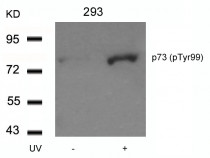ARG51562
anti-p73 phospho (Tyr99) antibody
anti-p73 phospho (Tyr99) antibody for IHC-Formalin-fixed paraffin-embedded sections,Western blot and Human,Mouse,Rat
Cancer antibody; Cell Biology and Cellular Response antibody; Gene Regulation antibody
Overview
| Product Description | Rabbit Polyclonal antibody recognizes p73 phospho (Tyr99) |
|---|---|
| Tested Reactivity | Hu, Ms, Rat |
| Tested Application | IHC-P, WB |
| Host | Rabbit |
| Clonality | Polyclonal |
| Isotype | IgG |
| Target Name | p73 |
| Antigen Species | Human |
| Immunogen | Peptide sequence around phosphorylation site of tyrosine 99 (S-P-Y(p)-A-Q) derived from Human P73. |
| Conjugation | Un-conjugated |
| Alternate Names | p53-like transcription factor; p53-related protein; P73; Tumor protein p73 |
Application Instructions
| Application Suggestion |
|
||||||
|---|---|---|---|---|---|---|---|
| Application Note | * The dilutions indicate recommended starting dilutions and the optimal dilutions or concentrations should be determined by the scientist. |
Properties
| Form | Liquid |
|---|---|
| Purification | Antibodies were produced by immunizing rabbits with KLH-conjugated synthetic phosphopeptide. Antibodies were purified by affinity-chromatography using epitope-specific phosphopeptide. In addition, non-phospho specific antibodies were removed by chromatogramphy using non-phosphopeptide. |
| Buffer | PBS (without Mg2+ and Ca2+, pH 7.4), 150mM NaCl, 0.02% Sodium azide and 50% Glycerol. |
| Preservative | 0.02% Sodium azide |
| Stabilizer | 50% Glycerol |
| Concentration | 1 mg/ml |
| Storage Instruction | For continuous use, store undiluted antibody at 2-8°C for up to a week. For long-term storage, aliquot and store at -20°C. Storage in frost free freezers is not recommended. Avoid repeated freeze/thaw cycles. Suggest spin the vial prior to opening. The antibody solution should be gently mixed before use. |
| Note | For laboratory research only, not for drug, diagnostic or other use. |
Bioinformation
| Database Links | |
|---|---|
| Gene Symbol | TP73 |
| Gene Full Name | tumor protein p73 |
| Background | This gene encodes tumor protein p73, which is a member of the p53 family of transcription factors involved in cellular responses to stress and development. The family members include p53, p63, and p73 and have high sequence similarity to one another, which allows p63 and p73 to transactivate p53-responsive genes causing cell cycle arrest and apoptosis. The family members can interact with each other in many ways involving direct or indirect protein interactions, resulting in regulation of the same target gene promoters or regulation of each other's promoters. The p73 protein is expressed at very low levels in normal tissues and is differentially expressed in a number of tumors. The p73 gene expresses at least 35 mRNA variants due to the use of alternate promoters, alternate translation initiation sites, and multiple splice variations. Theoretically this can account for 29 different p73 isoforms; however, the biological validity and the full-length nature of most variants have not been determined. |
| Function | Participates in the apoptotic response to DNA damage. Isoforms containing the transactivation domain are pro-apoptotic, isoforms lacking the domain are anti-apoptotic and block the function of p53 and transactivating p73 isoforms. May be a tumor suppressor protein. [UniProt] |
| Research Area | Cancer antibody; Cell Biology and Cellular Response antibody; Gene Regulation antibody |
| Calculated MW | 70 kDa |
| PTM | Isoform alpha (but not isoform beta) is sumoylated on Lys-627, which potentiates proteasomal degradation but does not affect transcriptional activity. Phosphorylation by PLK1 and PLK3 inhibits the transcription regulator activity and pro-apoptotic function. Higher levels of phosphorylation seen in the brain from patients with Huntington disease. Polyubiquitinated by RCHY1/PIRH2; leading to its degradation by the proteasome. |
Images (1) Click the Picture to Zoom In






